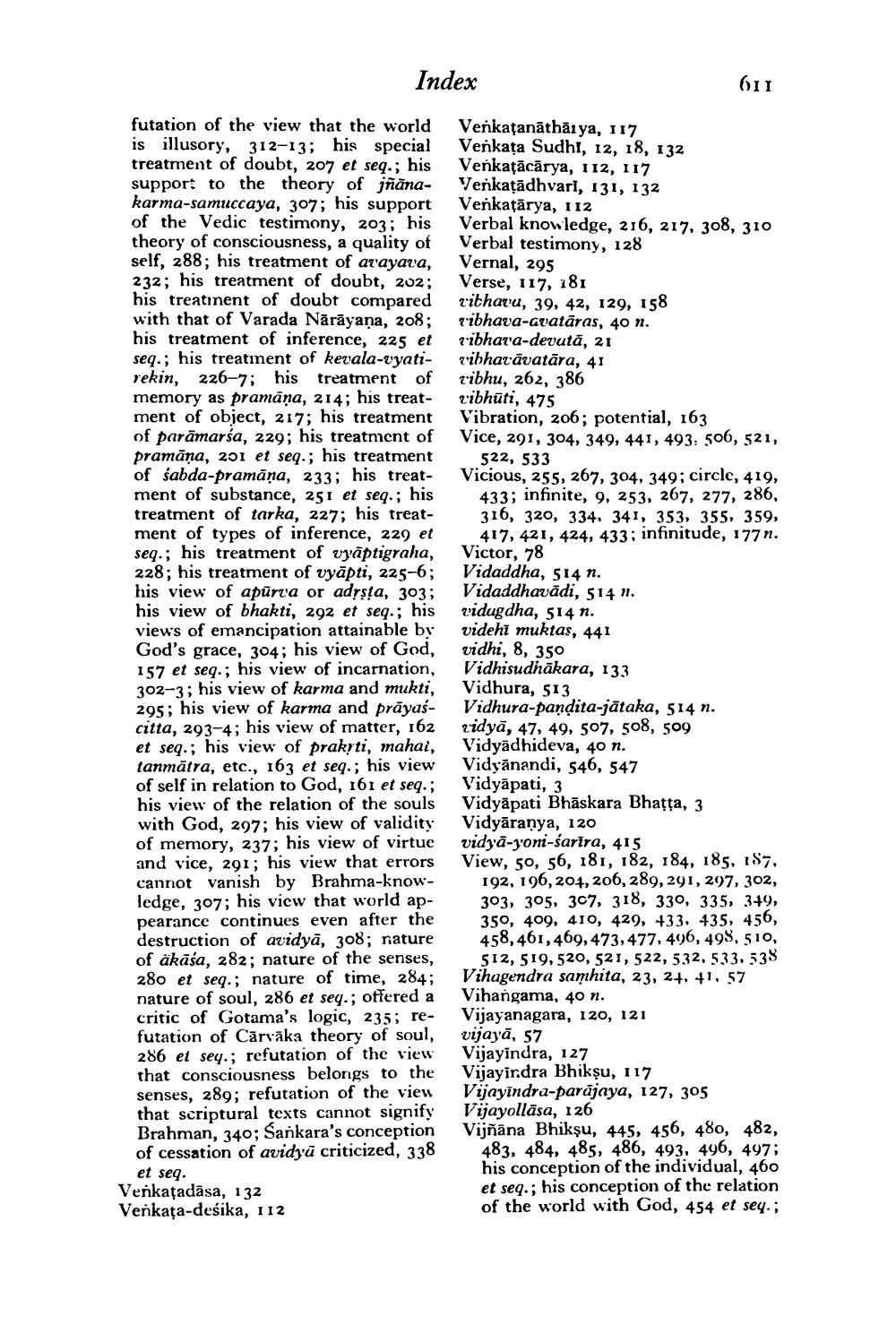________________
Index
futation of the view that the world is illusory, 312-13; his special treatment of doubt, 207 et seq.; his support to the theory of jñānakarma-samuccaya, 307; his support of the Vedic testimony, 203; his theory of consciousness, a quality of self, 288; his treatment of avayava, 232; his treatment of doubt, 202; his treatment of doubt compared with that of Varada Nārāyaṇa, 208; his treatment of inference, 225 et seq.; his treatment of kevala-vyatirekin, 226-7; his treatment of memory as pramāņa, 214; his treatment of object, 217; his treatment of paramarśa, 229; his treatment of pramāņa, 201 et seq.; his treatment of sabda-pramāņa, 233; his treatment of substance, 251 et seq.; his treatment of tarka, 227; his treatment of types of inference, 229 et seq.; his treatment of vyaptigraha, 228; his treatment of vyapti, 225-6; his view of apurva or adṛṣṭa, 303; his view of bhakti, 292 et seq.; his views of emancipation attainable by God's grace, 304; his view of God, 157 et seq.; his view of incarnation, 302-3; his view of karma and mukti, 295; his view of karma and prayascitta, 293-4; his view of matter, 162 et seq.; his view of prakṛti, mahai, tanmatra, etc., 163 et seq.; his view of self in relation to God, 161 et seq.; his view of the relation of the souls with God, 297; his view of validity of memory, 237; his view of virtue and vice, 291; his view that errors cannot vanish by Brahma-knowledge, 307; his view that world appearance continues even after the destruction of avidya, 308; nature of ākāśa, 282; nature of the senses, 280 et seq.; nature of time, 284; nature of soul, 286 et seq.; offered a critic of Gotama's logic, 235; refutation of Carvaka theory of soul, 286 et seq.; refutation of the view that consciousness belongs to the senses, 289; refutation of the view that scriptural texts cannot signify Brahman, 340; Sankara's conception of cessation of avidya criticized, 338 et seq. Venkatadāsa, 132 Venkata-deśika, 112
Venkatanāthāiya, 117 Venkata Sudhi, 12, 18, 132 Venkaṭācārya, 112, 117 Venkatadhvari, 131, 132 Venkatarya, 112
611
Verbal knowledge, 216, 217, 308, 310 Verbal testimony, 128 Vernal, 295
Verse, 117, 181
vibhava, 39, 42, 129, 158 ribhava-avatāras, 40 n. vibhava-devută, 21
vibhavavatāra, 41 vibhu, 262, 386 vibhuti, 475
Vibration, 206; potential, 163
Vice, 291, 304, 349, 441, 493: 506, 521, 522, 533
Vicious, 255, 267, 304, 349; circle, 419, 433; infinite, 9, 253, 267, 277, 286, 316, 320, 334, 341, 353, 355, 359, 417, 421, 424, 433; infinitude, 177 n. Victor, 78 Vidaddha, 514 n. Vidaddhavadi, 514 1. vidugdha, 514 n. videhi muktas, 441 vidhi, 8, 350 Vidhisudhakara, 133 Vidhura, 513 Vidhura-pandita-jātaka, 514 n. vidya, 47, 49, 507, 508, 509 Vidyadhideva, 40 n. Vidyanandi, 546, 547 Vidyapati, 3
Vidyapati Bhaskara Bhaṭṭa, 3 Vidyaranya, 120 vidya-yoni-sarira, 415
View, 50, 56, 181, 182, 184, 185, 187. 192, 196, 204, 206, 289, 291, 297, 302, 303, 305, 307, 318, 330, 335, 349, 350, 409, 410, 429, 433. 435, 456, 458,461,469,473,477, 496, 498, 510, 512, 519, 520, 521, 522, 532. 533.538 Vihagendra samhita, 23, 24, 41, 57 Vihangama, 40 n. Vijayanagara, 120, 121 vijaya, 57 Vijayindra, 127 Vijayindra Bhikṣu, 117 Vijayindra-parajaya, 127, 305 Vijayollāsa, 126
Vijñāna Bhiksu, 445, 456, 480, 482, 483, 484, 485, 486, 493, 496, 497; his conception of the individual, 460 et seq.; his conception of the relation of the world with God, 454 et seq.;




